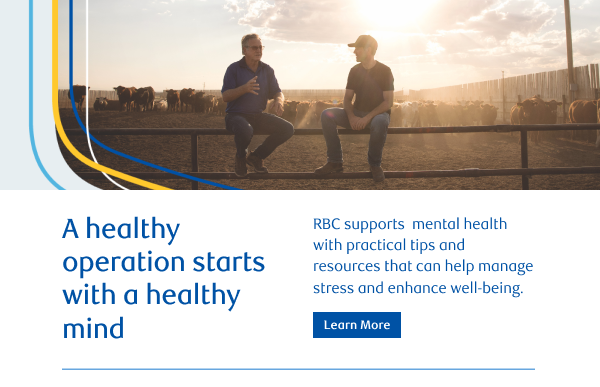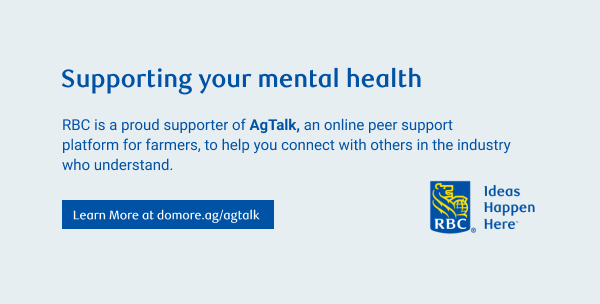| |

|
| |
Farming is a way of life that demands resilience, hard work, and determination—but it can also take a toll on mental health. The pressures of unpredictable weather, fluctuating markets, and long hours can add up, leaving many producers feeling overwhelmed.
A national study from 2020* revealed that 35% of Canadian farmers experience elevated levels of depression, 57% report high anxiety, and 76% live with moderate to high stress. Despite these numbers, nearly 40% of farmers say they feel uneasy asking for help, with stigma around “mental toughness” being a significant barrier.
The truth is, seeking help doesn’t mean you’re not strong—it means you care. That’s why we put together this package of strategies, tips and resources to help identify and protect the mental health of our farmers.
Recognizing When Stress Is Taking a Toll
Sometimes it can be difficult to self-assess your own mental wellness, but early detection of declining mental health is critical and can be easily recognized by family, friends and the community. Here’s what to look for:
- Change in Routines: Increased work hours, difficulties falling asleep or staying asleep despite exhaustion, withdrawal from family gatherings or avoiding social situations, excessive drinking or drug use, decline in personal appearance
- Physical Responses: Changes in appetite, churning stomach, clenched/grinding teeth, physical sickness
- Mental Reponses: Emotional detachment, anxiety, negative thinking/catastrophizing, difficulty making simple decisions, feelings of isolation, depression, wild mood swings (anger), forgetfulness or poor focus
- Reduced workplace performance: Decreased quality of work, less concerned with responsibilities, poorly fed animals, and notable decline in crop or farm appearance
Take Positive Action
When you or a loved one are feeling stressed, there are many simple ways to help reduce anxiety.
- Exercise, Proper Diet and Sleep: Physical activity, healthy well-balanced meals and 7-9 hours of sleep are known to dramatically help improve mood and decrease stress.
- Have a Farm Business Plan: Quite often feelings of anxiety and stress come from the helplessness producers feel when mother nature isn’t cooperating or, from dealing with markets and other factors beyond their control. A recent farmer survey indicated that 88% of farmers who use written business plans claim it helps lower their stress levels and positively contributes to their peace of mind.
- Positive Thinking and Gratitude: Avoiding stressful relationships or triggers and practicing gratitude are great ways to stay focused on the positives in your life. Additionally, relaxing activities like meditation or reading are well documented stress reducers.
- Stay Connected and Talk About It: Farmers have a well-earned reputation for being “tough” and independent, but the experts agree – the number one way to help reduce stress and improve mental health is to talk about your concerns with a friend, loved one or qualified professional.
Don’t Hesitate to Ask for Help
You’re not alone. If stress feels like it’s too much to manage on your own, reaching out for professional support can make all the difference. A conversation with your doctor or a qualified therapist can guide you toward the resources you need to feel better and take care of yourself.
Taking care of your mental health is just as important as tending to your crops or livestock. When you’re at your best, everything around you benefits—your family, your farm, and your future.
|
| |
|
|
|
| |

|
| |
*Social Psychiatry and Psychiatric Epidemiology (2020) 55:229–236
*This article is intended as general information only and is not to be relied upon as constituting legal, financial or other professional advice. A professional advisor should be consulted regarding your specific situation. Information presented is believed to be factual and up-to-date but we do not guarantee its accuracy and it should not be regarded as a complete analysis of the subjects discussed. All expressions of opinion reflect the judgment of the authors as of the date of publication and are subject to change. No endorsement of any third parties or their advice, opinions, information, products or services is expressly given or implied by Royal Bank of Canada or any of its affiliates.
®/™Trademark(s) of Royal Bank of Canada. RBC and Royal Bank are registered trademarks of Royal Bank of Canada.
RBC Royal Bank | Royal Bank of Canada l RBC Waterpark Place, 88 Queens Quay West, 12th Floor, Toronto, ON, M5J 0B8, Canada | www.rbcroyalbank.com
|
|
| |
|
|